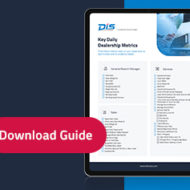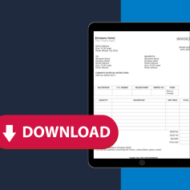DMS vs. ERP: Which is the Best Software for Your Dealership?
A DMS or an ERP: which one is the best fit for your dealership?
While both types of systems manage core business functions, they vary in scope, product options, implementation, quoting, pricing, and contract details. The right software should work for your dealership, not the other way around. A dedicated Dealership Management System (DMS) solution is designed with this principle at its core and will ensure you have no surprises. Meanwhile, an Enterprise Resource Planning (ERP) Software will get the job done, but you will likely need to jump through hoops to make it work for your dealership.
Here is a breakdown of the difference between what a DMS and an ERP can do for your dealership.
Industry-Specific Functionality
DMS: A DMS is tailored specifically for your industry, providing functionalities that meet the unique needs of dealerships.
ERP: ERP systems are typically generalized to cater to a wide range of industries. They are not designed specifically for dealerships.
OEM Integrations
DMS: A DMS interfaces with OEMs, allowing dealers to efficiently handle equipment orders and directly engage with essential OEMs and aftermarket suppliers. This streamlines tasks like order submissions, warranty claims, and more.
ERP: ERP systems may lack direct integrations with OEMs, making parts ordering and inventory management more challenging and less streamlined. They may also lack warranty systems integration.
Initial Systems Implementation Costs
DMS: Industry-specific DMS providers excel in installing software for dealers and provide an “all-included” quote for implementation.
ERP: ERP systems typically provide a best guess “time and materials” quote for implementation, which typically results in added installation expenses. ERPs also typically cost double the amount per user per month compared to a DMS and insist on contract terms that leave no way out for the dealer.
Parts and Inventory Management
DMS: A DMS lets you easily look up what parts you have in stock and automatically order the right parts for any location. You can also instantly import updated parts and price lists into the system, reducing manual effort.
ERP: ERP systems provide general inventory management features, but automated parts ordering and updates may not be as seamless as with a DMS.
Data Analysis and Reporting
DMS: A DMS can provide dealership-focused dashboards and analytics, keeping track of the industry standard key performance indicators (KPIs) and insights to make more informed decisions (ex. parts absorption, stock order performance, and more).
ERP: ERPs provide generic reporting that may not highlight the KPIs most relevant to a dealership. ERP reporting tools won’t provide the same level of detail about dealership operations.
Customer Relationship Management (CRM)
DMS: A DMS provides you with quick and easy access to relevant customer information across all departments and store locations. This empowers sales teams to access complete unit information, engage leads, distribute quotes, and close more deals.
ERP: ERPs might have some CRM capabilities but might not be tailored to a dealership’s specific requirements. Typical ERPs require bolt-on third party CRM systems.
User Training & Support
DMS: With a DMS, you get customer support from a team of industry experts who understand your dealership’s goals and challenges. You also benefit from being part of a network of industry partners for additional training, access to resources, and support.
ERP: ERPs offer a broad spectrum of customer support and might lack the specialized knowledge needed to resolve or help with dealership-specific needs and challenges. Access to industry-specific resources or training may be limited.
Scalability
DMS: A DMS is highly scalable, allowing your business to grow without any substantial system changes. It can support an increase in the volume of transactions, customers, and users.
ERP: ERP systems are also scalable, but often at a higher cost and with more complexity due to the requirements for additional customizations as the business grows.
System Specifications
DMS: DMS systems are typically cloud-based, providing flexibility, easy accessibility, and lower hardware requirements. They also offer improved security since the DMS provider is responsible for operating your cloud server, managing security measures, and executing daily data backups.
ERP: ERP systems can be both on-premises and cloud-based. Cloud-based ERPs offer similar advantages to a cloud-based DMS but may still be more complex to manage, requiring an onsite IT department.
![Rentals: The Biggest Opportunity Dealer Overlook [eBook]](https://www.discorp.com/wp-content/uploads/2025/08/DIS-Rentals-Guide-Preview-Banner-copy-190x190.jpg)


![10 Things You Should See in Every DMS Demo [PDF]](https://www.discorp.com/wp-content/uploads/2024/07/DIS-10-things-to-see-in-a-demo-Guide-Social-Preview-Banner-copy-190x190.jpg)